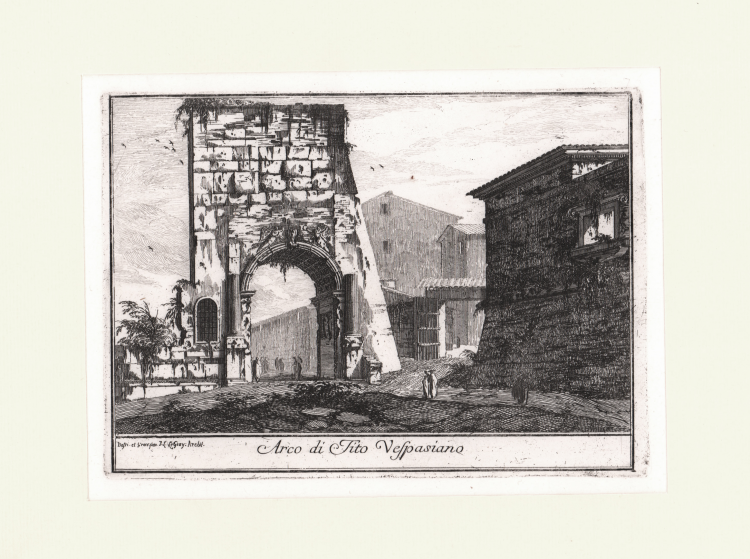



| Reference: | S28174 |
| Author | Jean-Laurent LE GEAY |
| Year: | 1745 |
| Zone: | Arco di Tito |
| Printed: | Rome |
| Measures: | 180 x 130 mm |


| Reference: | S28174 |
| Author | Jean-Laurent LE GEAY |
| Year: | 1745 |
| Zone: | Arco di Tito |
| Printed: | Rome |
| Measures: | 180 x 130 mm |
Etching, around 1745, signed in plate. A very good impression with full margins, in perfect condition.
Taken from the “Varie Vedute di Roma Antica, e Moderna. Disegnate e Intagliate da Celebri Autori” printe in Rome by Fausto Amidei, 1748.
The collection, in 4th oblong, is published by Fausto Amidei in various editions from 1745 to 1750, and by Giovanni Bouchard in 1752. It contained an engraved frontispiece and 93/96 plates, of which 47 signed by Piranesi and others by Giraud, Carloni, Nicole, Mogalli, Bellicard, Le Geay, and Anesi.
Early works by Piranesi, who had just arrived in Rome where he was a student of the workshop of Giuseppe Vasi. Vasi’s works will take the name of the 'Magnificenze di Roma'; from 1747; at the beginning of the work Piranesi joined him, but, at least since 1744, he produced his own views, which in 1745 formed the most important nucleus of the 'Varie Vedute di Roma antica e moderna disegnate e intagliate da celebri autori' for the bookseller and editor Amidei .
Taken from " Il Mercurio errante, delle grandezze di Roma, tanto antiche che moderne" di Pietro Rossini. Roma 1760.
Jean-Laurent LE GEAY (1710 – dopo il 1786)
|
Was a French neoclassical architect with an unsatisfactory career largely spent in Germany. His artistic personality remained shadowy until recently, though he was allowed to have had numerous pupils among the avant-garde of neoclassicism. He won the Prix de Rome in architecture in 1732.
|
Jean-Laurent LE GEAY (1710 – dopo il 1786)
|
Was a French neoclassical architect with an unsatisfactory career largely spent in Germany. His artistic personality remained shadowy until recently, though he was allowed to have had numerous pupils among the avant-garde of neoclassicism. He won the Prix de Rome in architecture in 1732.
|